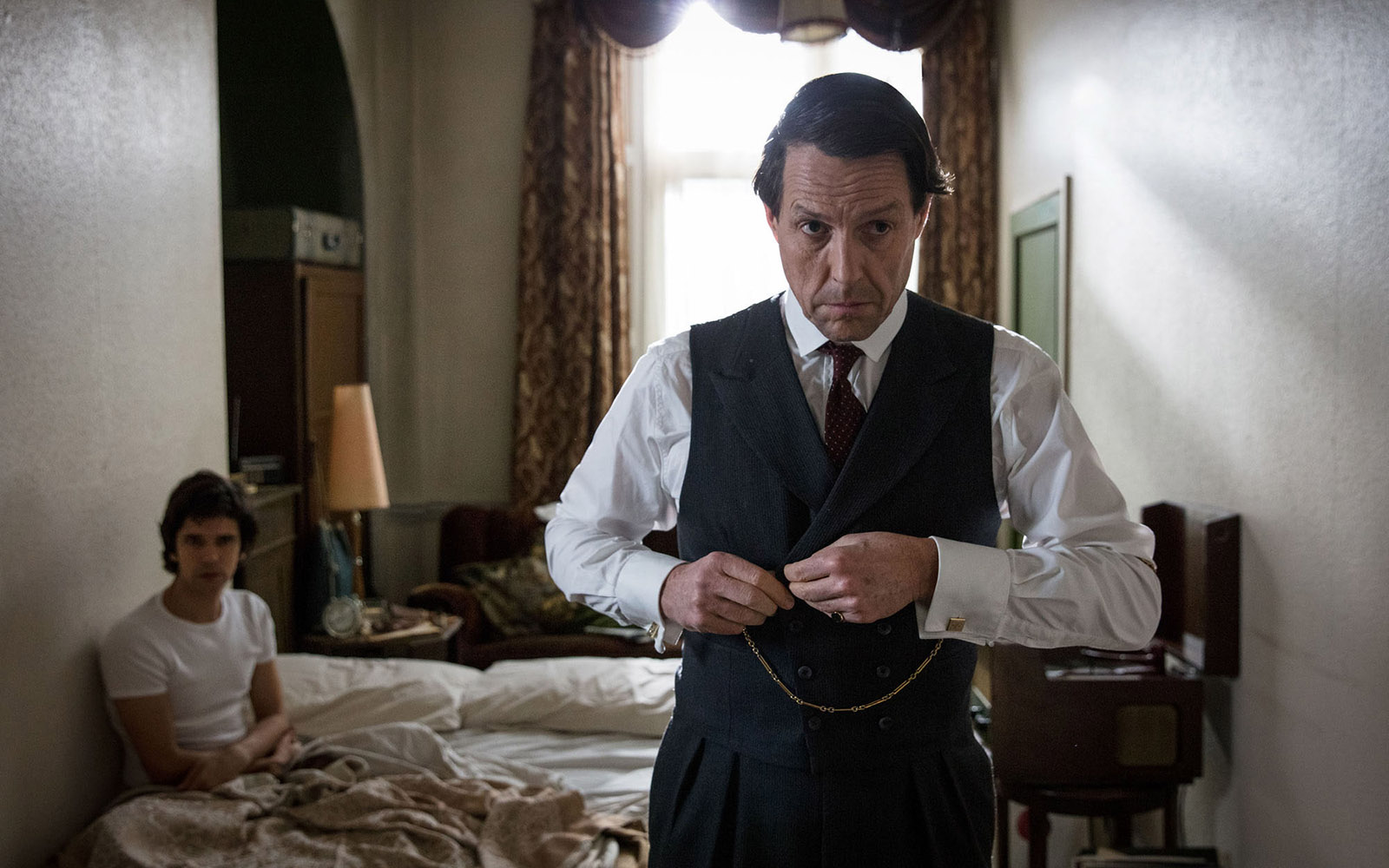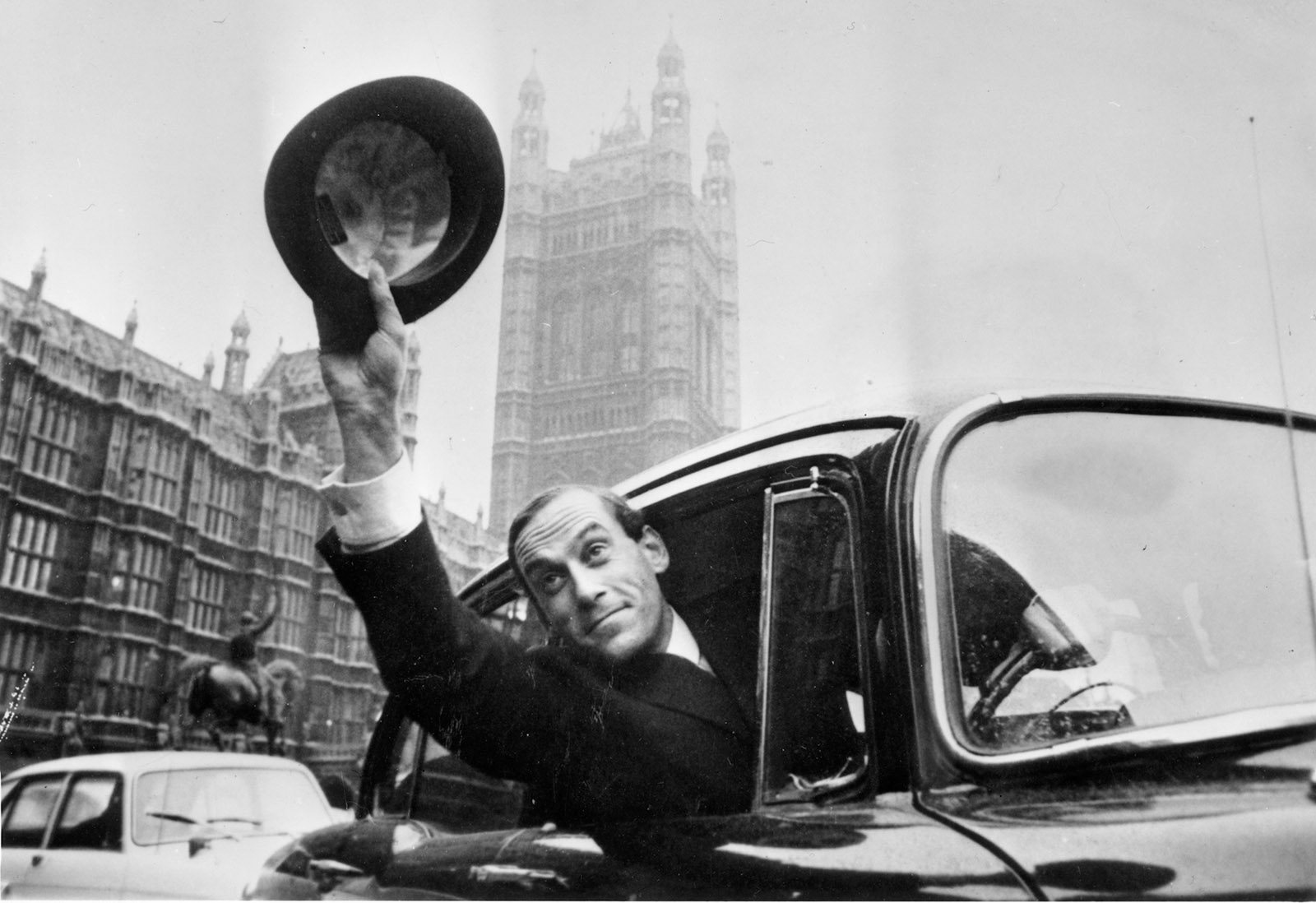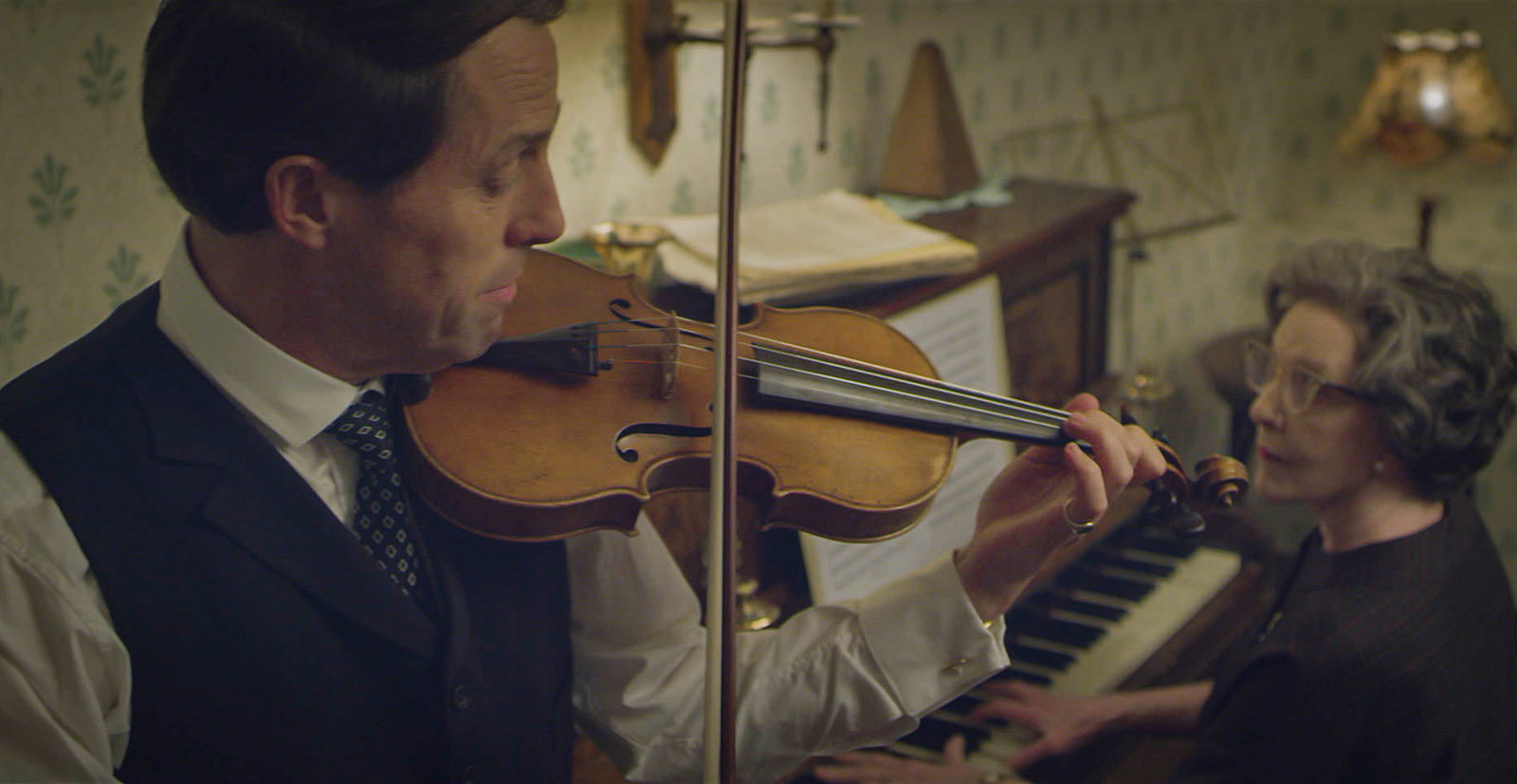Jeremy Thorpe was one of the most talented politicians of postwar Britain. Elected to Parliament in 1959 at the age of thirty, he was an advocate for liberal causes (small and capital “L”), including the abolition of capital punishment, increased immigration from the Commonwealth, proportional representation in elections, and British membership in the European Economic Community (forerunner to the European Union). One of the most impassioned parliamentary critics of white minority rule in South Africa and Rhodesia, Thorpe was an outspoken supporter of sanctions on both these formerly British territories; he even advocated bombing the latter after its illegal Unilateral Declaration of Independence.
When Thorpe took control of the Liberals in 1967, he was, at thirty-seven, the youngest person to lead a British political party in over a century. Young, dashing, progressive, and nattily dressed, he symbolized a fresh departure from the hidebound and dour political style that dominated Westminster at the time.
In the 1974 general election, at the height of his political prowess, Thorpe won 19 percent of the popular vote for the Liberal Party and its greatest number of seats since the 1930s. Yet just four years later, Thorpe would earn another distinction that erased all the preceding achievements from public memory when he was accused of the most serious criminal charges ever leveled against a member of Parliament: conspiracy and incitement to murder.
Thorpe’s precipitous fall from grace is the subject of A Very English Scandal, a BBC mini-series now available on Amazon and based on a 2016 book of the same name by the British journalist John Preston. Starring Hugh Grant as Thorpe, the film is both a tragicomic period piece and political docudrama. It also serves, nearly four decades after the events depicted, as an opportunity to reflect upon the evolution and obsolescence of that feature of modern gay existence: the closet.
The origins of the Thorpe Affair lie in a chance encounter between the recently-elected MP and a twenty-one-year-old stable boy named Norman Scott, né Josiffe, in 1961. As the Liberal grandee David Steel would later tell Preston, Scott “gave me the impression of being one of those rather inadequate drifters through life one meets from time to time who are always ready to blame their misfortunes on someone else.” Yet Thorpe, however briefly, was smitten. Years before sex between men was decriminalized with the passage of the 1967 Sexual Offences Act, the two carried on a covert relationship. Thorpe put the young man up in a London flat, and Scott—performed by the prodigiously versatile Ben Whishaw, who can now add camp hysteric to his long list of credits alongside Hamlet and Q from the James Bond series—acquired the status of being “kept.”
Displaying the sort of heedless risk-taking that would come to define his personal and professional life, Thorpe wrote copious, suggestive notes to his lover on parliamentary letterhead. In one such missive, regarding a possible trip to the Continent, Thorpe employed a term of endearment that would come back to haunt him: “Bunnies can (and will) go to France.”
The unlawfulness of homosexuality, combined with Thorpe’s ruthless political ambition, doomed the affair from the start. After inevitably disposing of the younger man, Thorpe went on to marry a woman (the perhaps aptly named Caroline Allpass), with whom he had a child, and quickly rose up the Liberal ranks. Yet the emotionally unstable Scott felt wronged, and began speaking to anyone who would listen, including the police, about his homosexual relationship with the up-and-coming political leader. In 1965, Scott even went so far as to write a letter to Thorpe’s mother, Ursula, in which he alleged that her son, during a visit to the maternal home, had corrupted him with “this vice that lies latent in every man.”
As the film portrays it, the seduction is by turns hilarious and pathetic, redolent of a time in which homosexuality was, of necessity, furtive and mysterious. After signaling his intentions to an utterly oblivious Scott by furnishing him a copy of Giovanni’s Room, Thorpe returns wielding a tub of petroleum jelly—“every bachelor’s friend,” he quips, a line attributable not, alas, to Thorpe himself but to scriptwriter Russell T. Davies, creator of the landmark gay television drama Queer As Folk. As if this consummation of the love that dare not speak its name were not English enough in its double-entendres and euphemisms, the name of Ursula Thorpe’s residence was “Stonewalls.”
For more than a decade after the relationship ended in the early 1960s, Thorpe issued—initially through his friend and fellow Liberal MP Peter Bessell—an intermittent blend of handouts and threats to Scott. These didn’t have the desired effect of shutting him up, however, and the lingering specter of exposure convinced Thorpe that the only way to prevent his ex-lover from going public was to kill him. Doing so, he allegedly told Bessell, would be like “shooting a sick dog.”
Advertisement
That was, in fact, what would actually happen in 1975, when another of Thorpe’s friends (Bessell having, by this time, fled his creditors to California) arranged, via a carpet salesman, for an off-duty airline pilot to carry out the despicable deed. On a remote country road, the would-be assassin first shot Scott’s Great Dane, Rinka, in the head, but then, as he rounded on Scott, the gun jammed. The putative hitman fled, leaving Scott distraught by the side of the road and Rinka as the only fatal casualty of Jeremy Thorpe’s hubris.
Though his homosexuality was long a subject of rumor around the halls of Westminster, Thorpe was the beneficiary of a system that protected certain men provided they possessed the requisite political power and connections. Presented with information about the sexual peccadilloes of his political rival, for instance, the Conservative Prime Minister Edward Heath—himself a bachelor dogged by rumors about his sexuality—refrained from exploiting it, in deference to what Preston writes was an “unwritten code” governing politicians’ private lives.
In this privileged dispensation, Thorpe was not unlike the influential American newspaper columnist Joe Alsop, who, on a 1957 trip to Moscow, was set up by the KGB in a gay honey trap. When the Soviets tried to blackmail the legendary cold warrior by distributing incriminating photographs of the encounter around Washington, D.C., not a single one of Alsop’s many enemies took the bait. Among the institutions and individuals that tried to protect Thorpe were various local police departments, Scotland Yard, two home secretaries, two prime ministers, and a speaker of the House of Commons. When Scott’s accusation of attempted murder became public, with the trial of the pilot-cum-hitman in 1976, Harold Evans, then the editor of The Sunday Times, told Preston that his paper initially gave Thorpe the benefit of the doubt—motivated, in Preston’s words, “by his not wanting The Sunday Times to appear homophobic.”
Four decades after the events in question—a period during which a revolution in acceptance of homosexuality has occurred—that sounds like an opportunistic rationalization for the real reason why the press, police, and politicians all took the side of Jeremy Thorpe over Norman Scott’s: the former was an Old Etonian leader of a major political party, the latter an uneducated transient. The real culprit was class prejudice, a closing of ranks that protected Thorpe and froze out Scott—snobbery trumping homophobia. A Very English Scandal authentically portrays the grim seediness of postwar British gay life, its mostly comic tone occasionally darkened by harrowing depictions of what legalized homophobia wrought—a world and sensibility also memorably captured by Stephen Frears’s 1987 biopic about the playwright Joe Orton, Prick Up Your Ears. A lawyer for one of Thorpe’s co-conspirators tells the jury that homosexuals had a “terrifying propensity for malice”; Lord Arran, who led the effort in the House of Lords to decriminalize homosexuality, recalls the tragic suicide of his gay brother; a montage of Thorpe’s nocturnal pick-ups all culminate in violence.
But the film has less to say about that other pervasive feature of British life: class. The aristocratic Thorpe’s dalliance with a younger, working-class, albeit effeminate man fits into a long and storied British tradition, from the Victorian-era London exploits of Oscar Wilde to the closing romance in E.M. Forster’s Maurice, to J.R. Ackerley’s unattainable “Ideal Friend,” to the 1950s Wildeblood case (that latter involved a Daily Mail diplomatic correspondent named Peter Wildeblood, who was imprisoned under the same statute used to prosecute Oscar Wilde; following his release from prison, Wildeblood penned a treatise advocating the decriminalization of homosexuality, Against the Law).
As Preston’s book and the drama serial make clear, and as any half-sentient individual at the time should have deduced, Jeremy Thorpe ought to have been found guilty of conspiring to murder Norman Scott. But with the weight of the British political, media, and judicial establishment arrayed against him, Scott didn’t have a chance. The most egregious example of this institutional bias was the set of instructions delivered by the judge to the jury before dismissing them to their deliberations. This supposedly impartial man of justice declared that Scott was “a crook, a fraud, a sponger, a whiner, and a parasite… But, of course, he could still be telling the truth.” (During the film’s closing credits, a clip plays of the comedian Peter Cook’s brilliant parody of this speech, not much separating the judge’s actual guidelines from their satirical rendering.)
Advertisement
The jury returned verdicts of “not guilty” on all counts. Dubbed “Rinkagate” at the time—one of the earliest scandals, following the Nixonian derivation, to have the suffix “gate” appended to it—the Thorpe Affair was one of several developments in the 1970s, including economic stagnation, an IMF bailout, Princess Margaret’s divorce, labor union strife and the resulting Three-Day Week (a government mandate to conserve electricity), that contributed to a collapse of public confidence in British establishment institutions.
Any doubt as to how Thorpe got away with it—how he persuaded so many people to lie and cheat, even attempt murder, for him—is put to rest by Hugh Grant’s virtuoso performance. Positively Clintonian in his rakishness, charm, and preternatural ability to enjoin people to clean up his many messes, Thorpe oozed charisma—which Grant captures brilliantly. Also like the Man from Hope, Thorpe acted as though the rules, which, as a legislator, he had a hand in formulating, didn’t apply to him, and he was self-pitying when anyone suggested that they did. Whishaw’s winsome portrayal of Scott as a troubled ingénu helps explain why Thorpe, whose experience of homosexuality rarely seemed to venture beyond the quick and squalid assignation, harbored feelings for him beyond the merely carnal.
In an interview upon the release of his book, two years ago, Preston observed that “If homosexuality had been legal, none of this would’ve happened.” In an ideal world, where homosexuality was not only never legally proscribed but also never the target of intense and widespread social stigma, this would be true. But to emphasize the repressive power of the closet minimizes the responsibility of Thorpe, who, superficial charm aside, was a deeply unsympathetic figure. After all, there have been many closeted British politicians throughout history. (Asked why his efforts at decriminalizing homosexuality had succeeded, while those aimed at protecting badgers had not, the eccentric Lord Arran replied, “There are not many badgers in the House of Lords.”) None of the homosexuals in Parliament, other than Jeremy Thorpe, however, conspired to murder their ex-lovers.
Thorpe, Preston writes, was “addicted to subterfuge,” relishing those cloak-and-dagger aspects of the life gay men were compelled to live while under the constant threat of legal sanction. Unlike other public figures and politicians who used the unwelcome exposure of their homosexuality to fight for gay acceptance and legal equality (like Wildeblood, or, in the United States, former Congressman Barney Frank), Thorpe never contributed much to that cause. Indeed, he denied being gay all his life. (He died in 2014, after being faithfully supported through a protracted decline with Parkinson’s disease by his long-suffering second wife, Marion.)
Never, in either the book or the film, does Thorpe evince a scintilla of guilt over the attempted murder he commissioned. In one highly effective scene that reveals his Janus-like character, the Liberal leader delivers a rousing speech to the Commons condemning atrocities in Biafra; on his way out the door, he surreptitiously confers with Bessell for the latest developments in his murder plot. Scott’s best one-liner, delivered at trial while under cross-examination, also had the virtue of being true: “Jeremy Thorpe lives on a knife-edge of danger!”
Ironically, Thorpe’s legal emancipation prevented a personal one. Had he been found guilty, the disgraced politician would have been compelled to seek public penance, which would have led him to at least acknowledge the reality of his relationship with Scott. Maybe he would have even come out of the closet. “It’s just conceivable that he might have been able to reinvent himself,” Preston has speculated. As it stood, however, absolved of the criminal charges against him, Thorpe lived a “weird half-life in a decaying mansion,” shunned by his former Liberal comrades and generally treated as guilty in spite of his having been found innocent. The jury’s verdict might have spared Thorpe a prison sentence, but it locked him in another: the closet.
A Very English Scandal, a three-part television miniseries based on John Preston’s book of the same name, is available on Amazon Prime.





